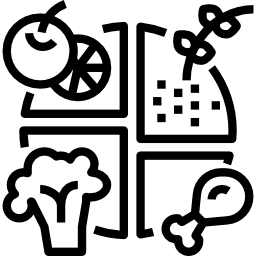Overview - Best Nutrition Hospital In Bangalore
The Department of Nutrition at SPARSH Hospital, Bangalore, recommends the right dietary intake for a balanced diet and provides nutritional care and advice to patients. Our team of nutritionists work alongside our medical team to provide the appropriate dietary advice for patients to follow, even after they’re discharged.
Dyslipidemia and Diet
Cholesterol is a waxy, fatty substance found in your blood. It is produced by the body. There are two main types: ‘good’ cholesterol (high-density lipoprotein; HDL) and ‘bad’ cholesterol (low-density lipoprotein; LDL).
- Low-density lipoprotein (LDL) – also known as ‘bad’ cholesterol because it can add to the build-up of plaque (fatty deposits) in your arteries and increase your risk of coronary heart disease.
- High-density lipoprotein (HDL) – also known as ‘good’ cholesterol because it can help to protect you against coronary heart disease by carrying LDL cholesterol away from the arteries to the liver where it is broken down and passed out of the body.
In addition to cholesterol, the blood also contains a type of fat called Triglycerides, which are stored in your body’s fat deposits. Hormones release triglycerides to make energy between meals.
Dietary Fats
Saturated Fat
This is solid at room temperature. It’s found in butter, lard, full-fat milk and yogurt, full-fat cheese, and high-fat meat. It is recommended by The Indian Heart Association to limit intake of saturated fats under 7% of daily calories because this fat tends to raise low-density lipoprotein (LDL) cholesterol levels in the blood.
Unsaturated Fat
This tends to be liquid at room temperature. It’s found in vegetable oils, fish and nuts. Studies show that eating foods rich in unsaturated fat instead of saturated fat improves blood cholesterol levels, which can decrease your risk of heart attack and stroke.
There are two main types of unsaturated fat:
- Monounsaturated Fat: This is found in olive, canola, peanut, sunflower and safflower oils, and in avocados, peanut butter and most nuts.
- Polyunsaturated Fat: This is found in sunflower, corn, soybean and cottonseed oils. It’s also found in walnuts, pine nuts, flaxseed, and sesame, sunflower and pumpkin seeds. Omega-3s fall into this category and are found in fatty fish, such as salmon, herring and sardines.
Causes of High Cholesterol:
- High intake of foods containing unhealthy fats (saturated fats and trans fats) – such as fatty meats, butter, cream, ice cream, coconut oil, palm oil and most deep-fried takeaway foods and commercially baked products (such as pies, biscuits, buns and pastries).
- Low intake of foods containing healthy fats – healthy fats tend to increase the good (HDL) cholesterol. Foods containing healthy fats include avocado, nuts, seeds, olives, cooking oils made from plants or seeds, and fish.
- Low intake of foods containing fibre – foods that are high in dietary fibre, particularly soluble fibre (Black beans, Lima beans, Brussels sprouts, Avocados, Sweet potatoes, Broccoli, Turnips, Pears etc.) can reduce the amount of bad (LDL) cholesterol in your blood. Include fibre rich foods in your diet by consuming vegetables, fruits, whole grains, legumes, nuts and seeds every day in moderate amounts.
- Low levels of physical activity and exercise
- Being overweight or obese
- Smoking and alcohol consumption
- Genetics
To reduce levels of bad cholesterol and triglycerides, one should follow a heart-healthy eating pattern. This means choosing from a variety of fresh and unprocessed foods, and limiting unhealthy fats, salt and added sugar.
Making lifestyle changes, following a heart healthy diet and regular physical activity, are very important to help reduce high LDL (bad) cholesterol.
- Maintain healthy body weight
- Reduce stress. Practice meditation
- Avoid smoking and alcohol. Non-alcoholic Red Wine can be taken in small amounts occasionally as it increases HDL (good cholesterol) and decreases levels of LDL (bad cholesterol)
- Control portion size. Eat more of low calorie, nutrient rich foods such as fruits and vegetables and less of high calorie, high sodium foods such as refined, processed or fast foods
Cholesterol and Healthy Eating
A heart-healthy eating pattern includes plenty of vegetables, fruit and whole grains, a variety of healthy protein-rich foods and healthy fats and oils.
Food Group – Cereals & Millets
Include
Choose high fibre grains, such as Oats, Whole wheat flour, Brown/Red rice or Parboiled rice, Millets- (Ragi, Foxtail millet, little millet, Jowar, Bajra)
Avoid
Avoid refined foods and their products like white rice, maida, white bread, noodles, macaroni, muffins, biscuits and granola bars, pies, pastries, cakes and biscuits
Food Group – Pulses and Legumes
Include
Dhals (Lentils) -Masoor, Toor, Green Gram, Channa dhal etc., Whole Kabuli Channa (Bengal Gram) Black channa, Double beans, Rajma, Cowpea etc.
Food Group – Vegetables
Include
All vegetables can be consumed like Bitter Gourd, Snake Gourd, Ridge Gourd, Bottle Gourd, Ivy Gourd, Ladies Finger, Tomatoes, Onion, Green Peas, Carrot and all Green Leafy Vegetables.
Avoid
IN CASE YOU ARE A DIABETIC, AVOID POTATO, SWEET POTATO, YAM, BEETROOT, TAPIOCA AND COLOCASIA*.
Food Group – Fruits
Include
Include apple, banana, citrus fruits- orange, sweet lime, grapefruit, lemon; berries- strawberry, blueberry, black berry; cranberry, cherries, papaya, pineapple, avocado, guava and melons (watermelon, muskmelon).
Avoid
IN CASE YOU ARE A DIABETIC, AVOID BANANAS, CUSTARD APPLE, MANGOES AND CHICKOO(sapota)*. [Consume only 1 permitted fruit per day]Food Group – Nuts & Seeds
Include
The Indian Heart Association suggests to include seeds and nuts about 40 grams, 3-4 times a week. E.g., Chia & Flax seeds, Almonds, Walnuts and Pistachios
Avoid
Food Group – Milk & Milk Products
Include
Include low fat/ skimmed milk, low fat curd, low fat paneer.
Avoid
Avoid whole milk, cheese and khoa.
Food Group – Flesh Foods
Include
Include 100 grams of boiled, baked, steamed or roasted white/lean meat like chicken (without skin) and fatty fishes which contain omega 3 fatty acids (salmon, sardine, tuna, mackerel, cord and herring) 2-3 times a week. Consume whole egg twice a week. Egg whites contain no fat or cholesterol, so you can eat them regularly as they are a good source of protein of high biological value.
Avoid
Avoid red meat (pork, beef, lamb and goat), organ meat (liver, heart, brain, kidney), processed meat (salami, sausages), shell fishes (crabs, prawns, shrimps, oysters and lobsters) as they are all high in saturated fats.
Food Group – Fats & Oils
Include
Use unsaturated vegetable oils like sunflower and safflower oil, or rice bran oil as it contains oryzanol that reduces triglycerides, cholesterol and LDL. Also use oils rich in MUFA’s (canola oil, peanut oil, olive oil and til oil).
Avoid
Limit your total intake of any oil used for cooking to 3-4 teaspoons per day. Completely avoid saturated fats like dalda, vanaspathi, ghee, butter, non-dairy creamers, coconut oil and fried foods like samosas, bajjis, puri, chips etc.
Foods to Include and Exclude
Include:
Foods Rich in (Healthy) Polyunsaturated Fats Include
- Soybean, sunflower, safflower, canola oil and margarine spreads made from these oils
- Pine nuts, walnuts and Brazil nuts.
- Fish
- Tahini (sesame seed spread)
- Linseed (flaxseed) and chia seeds
Foods Rich in (Healthy) Monounsaturated Fats
- Cooking oils made from plants or seeds, including: olive, canola, peanut, sunflower, soybean, sesame and safflower
- Avocados
- Olives
- Unsalted nuts such as almonds, cashews and peanuts
Dietary Fibre
- Fruit
- Vegetables
- Legumes (such as chickpeas, lentils, soybeans and bean mixes)
- Whole grains (for example, oats and barley)
- Nuts and seeds
Exclude
Foods Rich in (Unhealthy) Saturated Fats
- Processed meats (such as ham, bacon and salami)
- Deep fried fast foods
- Processed foods (such as biscuits and pastries)
- Takeaway foods (such as hamburgers and pizza)
- Fat on meat and skin on chicken
- Ghee and lard
- Coconut oil
- Palm oil (often called vegetable oil in products) cream and ice cream
- Butter
Foods Rich in (Unhealthy) Trans Fats
- Deep fried foods
- Baked goods (such as pies, pastries, cakes and biscuits)
- Takeaway foods
- Butter
- Foods that list ‘hydrogenated oils’ or ‘partially hydrogenated vegetable oils’ on the ingredients’ list
Therefore in order to maintain your cholesterol levels
- Make sure to follow the above guidelines
- Maintain healthy body weight. A minimum of 40-45 minutes of brisk walk both in the morning and evening is advisable
- Drink a minimum of 3-3.5 liters of water/ day
- Avoid alcohol intake and cigarette smoking
Why Choose SPARSH Hospital for Best Nutrition & Dietetic
SPARSH Hospital is one of the best nutrition & dietetic hospitals in Bangalore, offering expert care through its Department of Nutrition and Dietetics. Our team of experienced nutritionists in Bangalore provides personalized diet plans tailored to your health needs, whether for weight management, chronic disease prevention, or overall wellness. With advanced facilities and a holistic approach, we ensure that each patient receives optimal care for long-term health benefits. Trusted by many, SPARSH Hospital is committed to providing the highest quality nutrition services, making it the ideal choice for your dietary and nutritional needs in Bangalore.



